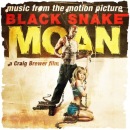Music Home / Entertainment Channel / Bullz-Eye Home
 Buy your copy from Amazon.com
Buy your copy from Amazon.com
| Various Artists: Black Snake Moan Soundtrack Released: 2001 |
Last year, Samuel L. Jackson set the Internets on fire with “Snakes on a Plane,” a movie only half as good/bad as its title suggested. Despite its failure, Jackson was somehow not deterred from signing on for another exploitation film with the word “snake” in the title; he returns to theatres this February in “Black Snake Moan,” a movie about a country bluesman (Jackson) who chains up a nymphomaniac (Christina Ricci) in an attempt to save her from her “wicked ways.” Sounds like a classy flick.
But wait, there’s more! Not only does Jackson star in the film, he also sings. Not just that, he sings the blues. It’s a dangerous move for the veteran actor, who has carefully crafted a well-earned reputation for being one of the baddest mofos in Hollywood. He already edged dangerously close to laughingstock status with “Snakes on a Plane” (not to mention his Eugene Levy buddy pic, “The Man”). Will his singing debut be the final nail in the coffin?
At first, the answer seems to be an overwhelming yes. The album’s first track, “Just Like a Bird without a Feather,” is a rotten mess; Jackson’s voice is as flat and painful as a cat being run over by a steamroller. But things pick up on the title track. Half spoken-word and half sung, it’s a painful soliloquy mourning the loss of an unborn child. Somehow Jackson’s harsh voice, which at this point has gone from agonizingly to endearingly raw, conveys the pure emotion and power of the song’s lyrics. By the time Sam gets to perform the R.L. Burnside tune “Alice Mae” live and in front of an audience, he sounds well-rehearsed and even somewhat professional. Sam really kicks out the jams on this one and on the next track, “Stackolee,” he just doesn’t kick them out, he takes the jams outside and beats the crap out of them. This violent tale lost love and cold-blooded murder is the ideal track for the actor, because when Samuel L. Jackson sings about putting “nine of my bullets in his motherfucking chest,” you believe. If anything, singing the blues has made Jackson even more of a badass.
Aside from some short instrumental interludes from Scott Bomar, the rest of the album is comprised of previously released material that serves as an introduction to the blues for novices, with both new bands and seasoned performers making appearances. Representing the new school, the critically acclaimed Black Keys contribute the menacing, rhythmic “When the Lights Go Out”; elsewhere, Detroit psychedelic rockers Outrageous Cherry show up with “Lord Have Mercy nn Me” which sounds like southern blues dipped in LSD and driven through Haight-Ashbury. Groovy.
Younger listeners and fans of indie rock have probably already heard both of these bands, though, so it’s great that classic, lesser-known performers are also represented, such as Jessie Mae Hemphill, whose “Standing in My Doorway Crying” rises above the stereotypical “my baby done left me and now I got no one else in the world” blues number, thanks to her striking voice and sparse instrumentation. But fans of the genre know the blues isn’t just about sulking in the corner about your loved one ditching you (although that’s a large part of it), and that’s made clear with “Old Black Mattie,” a juke-joint jam about a butt-naked drunk chick by R.L. Burnside, who was a longtime blues performer who didn’t achieve any real notoriety until the late 1980s (when he was already in his 60’s.) The North Mississippi All-stars, a more traditional blues-rock band, finish the album with their seven-minute jam “Mean Ol’ Wind Died Down,” a song that combines the best of classic country blues and new-school indie-rock/blues sensibilities.
Blues fans, indie rockers, and those who worship at the Church of Jackson should pick up this soundtrack. Not only does it prove that one of film’s great hard-asses can sing, it’s also a great introduction to the blues, both classic and modern.
~James B. Eldred
jeldred@bullz-eye.com






